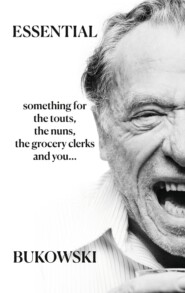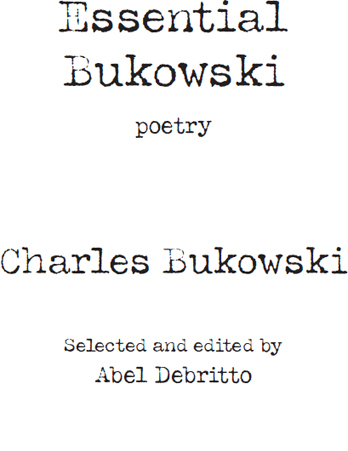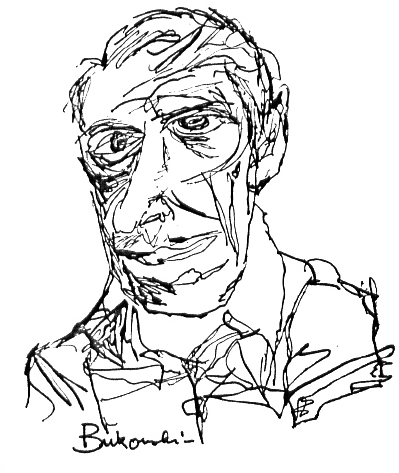
Полная версия:
Essential Bukowski: Poetry




COPYRIGHT
4th Estate
An imprint of HarperCollinsPublishers 1 London Bridge Street London SE1 9GF
www.4thEstate.co.uk
This eBook first published in Great Britain by 4th Estate in 2016
First published in the United States by Ecco, an imprint of HarperCollinsPublishers, in 2016
Copyright © 2016 by Linda Lee Bukowski
Cover photograph of Charles Bukowski by Mark Hanauer
Charles Bukowski asserts the moral right to be identified as the author of this work in accordance with the Copyright, Design and Patents Act 1988
A catalogue record for this book is available from the British Library
All rights reserved under International and Pan-American Copyright Conventions. By payment of the required fees, you have been granted the non-exclusive, non-transferable right to access and read the text of this e-book on-screen. No part of this text may be reproduced, transmitted, down-loaded, decompiled, reverse engineered, or stored in or introduced into any information storage and retrieval system, in any form or by any means, whether electronic or mechanical, now known or hereinafter invented, without the express written permission of HarperCollins
Source ISBN: 9780008225155
Ebook Edition © October 2016 ISBN: 9780008225162
Version: 2016-10-21
CONTENTS
Cover
Title Page
Copyright
Introduction
friendly advice to a lot of young men, and a lot of old men, too
as the sparrow
layover
the life of Borodin
when Hugo Wolf went mad
destroying beauty
the day I kicked a bankroll out the window
the twins
to the whore who took my poems
the loser
the best way to get famous is to run away
the tragedy of the leaves
old man, dead in a room
the priest and the matador
the state of world affairs from a 3rd floor window
the swan
beans with garlic
a poem is a city
consummation of grief
for Jane: with all the love I had, which was not enough
for Jane
john dillinger and le chasseur maudit
crucifix in a deathhand
something for the touts, the nuns, the grocery clerks and you . . .
no. 6
and the moon and the stars and the world:
true story
the genius of the crowd
I met a genius
swastika star buttoned to my ass
the blackbirds are rough today
If we take—
another academy
the poetry reading
the last days of the suicide kid
the shower
the mockingbird
style
girl in a miniskirt reading the Bible outside my window
the shoelace
those sons of bitches
hot
trouble with Spain
a radio with guts
some people never go crazy
the fisherman
the trash men
face of a political candidate on a street billboard
the proud thin dying
an almost made up poem
a love poem for all the women I have known
art
what they want
one for the shoeshine man
the meek have inherited
who in the hell is Tom Jones?
and a horse with greenblue eyes walks on the sun
an acceptance slip
the end of a short affair
I made a mistake
$$$$$$
metamorphosis
we’ve got to communicate
the secret of my endurance
Carson McCullers
sparks
the history of a tough motherfucker
oh, yes
retirement
luck
cornered
how is your heart?
the burning of the dream
hell is a lonely place
the strongest of the strange
8 count
we ain’t got no money, honey, but we got rain
flophouse
the soldier, his wife and the bum
no leaders
Dinosauria, we
nirvana
the bluebird
the secret
fan letter
to lean back into it
the condition book
a new war
the laughing heart
roll the dice
so now?
the crunch
Sources
Acknowledgments
About the Authors
Also by Charles Bukowski
About the Publisher
INTRODUCTION
With more than twenty Charles Bukowski poetry books now available in print and dozens of first-rate unpublished poems on file, an essential collection has been long overdue. The task at hand was titanic: A prolific author by any measure, with some five thousand poems on record written over a span of fifty years, Bukowski famously wrote almost every night in an alcoholic stupor, trashing most of the gibberish the morning after. Picking Bukowski’s best poems out of this massive heap was daunting, to say the least.
“The bluebird,” “the genius of the crowd,” “roll the dice,” “the crunch,” and other popular poems were strong contenders even before I put together a tentative list. As I pored over both the published and the unpublished work, some relatively obscure gems, such as “when Hugo Wolf went mad,” “sparks,” “the loser,” and “another academy” came back to life for me. I also included poems that were pivotal in Bukowski’s career, like “swastika star buttoned to my ass,” which moved longtime German translator, agent, and friend Carl Weissner to become a fervent Bukowski enthusiast after reading it in a small press magazine in England in 1966. There were one hundred and seventy poems in my final selection for the book, which then had to be cut down to only ninety-two—“democracy,” “they, all of them, know,” “the word,” and other top-notch poems had to be discarded.
These ninety-two essential poems barely represent two percent of Bukowski’s mammoth output, but his poetic evolution is hard to miss in this chronological collection. The early poems, with their lyricism and occasional surreal imagery, give way in the 1970s to Bukowski’s “Dirty Old Man” macho persona, when he finally achieves success in his fifties, after which he takes, in his final years, a more philosophical stance on life. Through it all, what remains the same is Bukowski’s brilliance at capturing things as they are, his crystal-clear snapshots of his immediate experiences as well as the world at large, which he hardly ever photoshopped after the fact.
It is precisely this genuineness, along with the timeless quality of Bukowski’s most accomplished poems, that makes us embrace his poetry with open arms: the day-to-day but crucial trivialities found in “the shoelace”; the sensuality of “the shower”; the forces of life at work in “the mockingbird” and “the history of a tough motherfucker”; the elusive nature of art in many of the poems; the self-deprecating humor in “we’ve got to communicate”; the imperfection that makes us almost perfect in “one for the shoeshine man”; and the heartfelt portraits of the artists that Bukowski looks up to.
There’s also the striking, disarming simplicity of “art” and “nirvana”; the Hemingwayesque spare lines of “Carson McCullers” and “hell is a lonely place”; the hymns to individualism and willpower of “no leaders” and “the genius of the crowd”; the never-take-things-for-granted spirit of “I met a genius”; the long narrative poems that read as well-paced short-stories; and the life-affirming drive of “the laughing heart” and “the crunch.” These last two poems show that, despite the darkness that often entered his life and poetry, Bukowski always saw the light at the end of the tunnel, and we can’t help but identify with that feeling.
These poems are Bukowski at his most captivating: unvarnished, witty, and passionate, showing us all “the way” as he listens to classical music on “a radio with guts” and drinks “the blood of the gods” in his small Los Angeles apartments and studios. The Buddha of San Pedro, Bukowski ultimately smiles because he knows the secret of it all is way beyond him, and that’s the beauty of it: Bukowski distills life to its very essence, squeezing the magic out of the ordinary with his unmistakable, surpassing simplicity.
Essential, indeed.
friendly advice to a lot of young men, and a lot of old men, too
Go to Tibet.
Ride a camel.
Read the Bible.
Paint your shoes blue.
Grow a beard.
Circle the world in a paper canoe.
Subscribe to the Saturday Evening Post. Chew on the left side of your mouth only. Marry a woman with one leg and shave with a straight razor. And carve your name in her anus.
Brush your teeth with gasoline.
Sleep all day and climb trees at night.
Be a monk and drink buckshot and beer.
Hold your head under water and play the violin.
Do a belly dance before pink candles.
Kill your dog.
Run for mayor.
Live in a barrel.
Break your head with a hatchet.
Plant tulips in the rain.
But don’t write any more poetry.
as the sparrow
To give life you must take life,
and as our grief falls flat and hollow
upon the billion-blooded sea
I pass upon serious inward-breaking shoals rimmed
with white-legged, white-bellied rotting creatures
lengthily dead and rioting against surrounding scenes.
Dear child, I only did to you what the sparrow
did to you; I am old when it is fashionable to be
young; I cry when it is fashionable to laugh.
I hated you when it would have taken less courage
to love.
layover
Making love in the sun, in the morning sun
in a hotel room
above the alley
where poor men poke for bottles;
making love in the sun
making love by a carpet redder than our blood,
making love while the boys sell headlines
and Cadillacs,
making love by a photograph of Paris
and an open pack of Chesterfields,
making love while other men—poor
fools—
work.
That moment—to this . . .
may be years in the way they measure,
but it’s only one sentence back in my mind—
there are so many days
when living stops and pulls up and sits
and waits like a train on the rails.
I pass the hotel at 8
and at 5; there are cats in the alleys
and bottles and bums,
and I look up at the window and think,
I no longer know where you are, and I walk on and wonder where the living goes when it stops.
the life of Borodin
the next time you listen to Borodin
remember he was just a chemist
who wrote music to relax;
his house was jammed with people:
students, artists, drunkards, bums,
and he never knew how to say “no.”
the next time you listen to Borodin
remember his wife used his compositions
to line the cat boxes with
or to cover jars of sour milk;
she had asthma and insomnia
and fed him soft-boiled eggs
and when he wanted to cover his head
to hide out the sounds of the house
she only allowed him to use the sheet;
besides there was usually somebody
in his bed
(they slept separately when they slept
at all)
and since all the chairs
were usually taken
he often slept on the stairway
wrapped in an old shawl;
she told him when to cut his nails,
not to sing or whistle
or put too much lemon in his tea
or press it with a spoon;
Symphony #2 in B Minor Prince Igor In the Steppes of Central Asia he could sleep only by putting a piece of dark cloth over his eyes; in 1887 he attended a dance at the Medical Academy dressed in a merrymaking national costume; at last, he seemed exceptionally gay and when he fell to the floor, they thought he was clowning.
the next time you listen to Borodin,
remember . . .
Конец ознакомительного фрагмента.
Текст предоставлен ООО «ЛитРес».
Прочитайте эту книгу целиком, купив полную легальную версию на ЛитРес.
Безопасно оплатить книгу можно банковской картой Visa, MasterCard, Maestro, со счета мобильного телефона, с платежного терминала, в салоне МТС или Связной, через PayPal, WebMoney, Яндекс.Деньги, QIWI Кошелек, бонусными картами или другим удобным Вам способом.
Вы ознакомились с фрагментом книги.
Для бесплатного чтения открыта только часть текста.
Приобретайте полный текст книги у нашего партнера:
Полная версия книги
Всего 10 форматов



